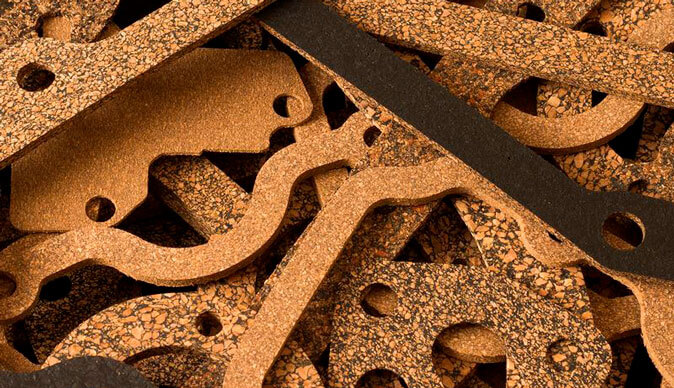Cork gaskets are a type of sealing material used in various industrial and automotive applications to prevent the leakage of fluids, gases, or contaminants between two mating surfaces. These gaskets are made from cork, a natural and renewable material derived from the bark of cork oak trees. Cork is known for its unique combination of properties that make it suitable for gasket applications.
Here are some key characteristics and information about cork gaskets:
- Material Composition: Cork gaskets are primarily composed of cork granules or cork sheets that are bonded together using adhesives or other binding agents. The cork material used is typically high-quality and chosen for its resilience and sealing properties.
- Compressibility: One of the most significant advantages of cork gaskets is their compressibility. Cork can be compressed easily between two surfaces, conforming to irregularities and imperfections in the mating surfaces. This property allows cork gaskets to create a tight and effective seal.
- Resilience: Cork gaskets possess a degree of resilience, which means they can return to their original shape after being compressed and released. This property helps maintain the seal even under varying temperature and pressure conditions.
- Chemical Compatibility: Cork gaskets are often used with non-aggressive fluids and gases, such as water, oils, fuels, and some mild chemicals. However, they are not suitable for applications involving highly corrosive or reactive substances.
- Temperature Range: Cork gaskets have a limited temperature range. They are generally suitable for use in environments with temperatures ranging from -20°C to 120°C (-4°F to 248°F). Exposing cork gaskets to temperatures outside this range can cause them to degrade or lose their sealing effectiveness.
- Applications: Cork gaskets find application in a variety of industries, including automotive, machinery, electrical equipment, and plumbing. Common uses include sealing engine components, valve covers, oil pans, and electrical enclosures.
- Customization: Cork gaskets can be easily customized to fit specific shapes and dimensions. Manufacturers can cut or shape cork gaskets to match the requirements of different equipment and machinery.
- Durability: The durability of cork gaskets depends on factors such as the quality of the cork material, the type of adhesive used, and the operating conditions. Proper maintenance and regular replacement, if necessary, can extend their lifespan.
- Environmental Considerations: Cork is a sustainable and environmentally friendly material because it is harvested from the bark of cork oak trees without harming the trees themselves. This makes cork gaskets an eco-friendly choice compared to some synthetic alternatives.
Cork gaskets offer several benefits that make them suitable for specific applications in various industries. Here are some of the key advantages of cork gaskets and the industries where they are commonly used:
Benefits of Cork Gaskets:
- Compressibility: Cork gaskets are highly compressible, allowing them to conform to irregular or uneven surfaces. This property ensures a tight and effective seal, even on mating surfaces with imperfections.
- Resilience: Cork gaskets have a degree of resilience, which means they can bounce back to their original shape after being compressed and released. This property helps maintain a consistent seal, even under varying pressure and temperature conditions.
- Sealing Effectiveness: Cork gaskets are known for their ability to create a reliable and leak-free seal, making them suitable for applications where preventing the escape of fluids or gases is crucial.
- Thermal Insulation: Cork is a natural insulator, which means cork gaskets provide some thermal insulation properties. This feature is beneficial in applications where temperature control or heat resistance is required.
- Environmental Sustainability: Cork is a renewable and environmentally friendly material sourced from cork oak trees. Harvesting cork does not harm the trees, making it a sustainable and eco-friendly choice.
- Customization: Cork gaskets can be easily cut or shaped to fit specific dimensions and requirements, making them versatile for various applications.
Industries Where Cork Gaskets Are Often Used:
- Automotive: Cork gaskets are used in the automotive industry for sealing engine components such as valve covers, oil pans, and water pumps. They are also employed in exhaust systems and various other vehicle parts.
- Machinery and Equipment: Cork gaskets find application in machinery and equipment, including pumps, compressors, and industrial engines, where they help prevent leaks and maintain operational efficiency.
- Electrical and Electronics: Cork gaskets are used in electrical enclosures and electronic equipment to seal against moisture and dust ingress, providing protection for sensitive components.
- Plumbing and HVAC (Heating, Ventilation, and Air Conditioning): Cork gaskets are used in plumbing and HVAC systems to create watertight seals in fittings, valves, and pipe joints.
- Marine: Cork gaskets are employed in the marine industry for sealing applications on boats and ships, including engine components, hatches, and plumbing systems.
- Aerospace: In some specialized aerospace applications, cork gaskets may be used for their sealing and insulation properties, particularly in non-critical areas.
- Industrial and Manufacturing: Cork gaskets are used in a wide range of industrial equipment, including pumps, valves, and hydraulic systems, to prevent fluid leakage and maintain operational integrity.
- Renewable Energy: In renewable energy applications such as solar panels and wind turbines, cork gaskets can be used to create seals in electrical enclosures and control systems.
In summary, cork gaskets are versatile sealing components known for their compressibility, resilience, and adaptability. They are commonly used in applications where a reliable, flexible, and environmentally friendly sealing solution is required, as long as the operating conditions and fluid compatibility are within their limitations.


